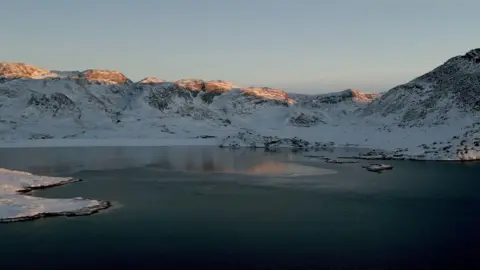 BBC
BBCThe sun is rising over the ice-capped mountains of Nuuk Fjord and we are traveling along one of the world's last wild frontiers.
But shadows are gathering here and across the rest of Greenland's frozen space.
He is going to be the President of the United States with Donald Trump Refusal to occupy Greenland by force is echoed through the conversation across the island.
“He's definitely welcome to come visit,” said the captain of the converted fishing boat that took us east. Aware that he has to do business with people of all political colors, he asked to remain anonymous, but used a phrase I hear over and over here.
“Greenland belongs to Greenlanders. So, Trump can visit but that's it.”
The water is flat calm as we pull into the isolated settlement of Copisilit – population about 40 – where a few hunters are out shooting seals.
It's -16C (3F), and the wind chill feels more like -27C
But near the harbor I meet a local church elder, Kalirak Ringstedt, 73, a great-grandfather, drying fillets of cod caught in fish-rich waters by his front door.
When I ask President-elect Trump about buying or invading Greenland, he laughs at first. Then his tone became serious.
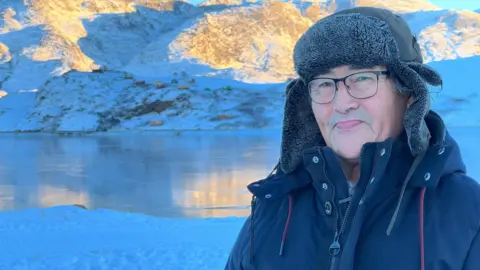
“It is not acceptable that he said this. Greenland is not for sale.”
Then he tells me how he learned to fish here with his father and grandfather and how he wants to preserve this life for his children and grandchildren.
Across the bay, the boat nosed through the broken surface ice. Two eagles perched on a rock, scanning the clear water for fish.
We were on our way to the farm of Angutimarik Hansen who, in addition to raising sheep, hunts seals, wildfowl and rabbits.
All of his winter feed for the sheep must be imported from Denmark, a reminder of how a harsh climate defines the possibilities of life here.
Inside his front door is a rack of hunting rifles. He is looking at them, noticing me.
“They only happen when there's an attack,” he joked.
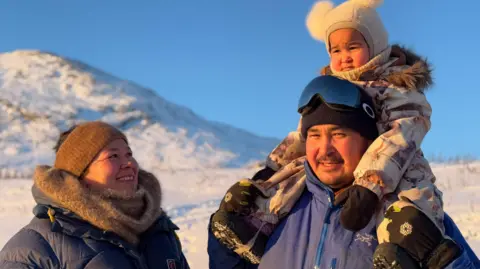
But his attitude to Mar-a-Lago's bellicose rhetoric isn't too relaxed.
“What a stupid man in the world like Trump,” he said. “We will never sell Greenland.”
The small ranch is about 3,000 miles (4,828 km) from Florida where the incoming US president gave his now infamous press conference last week.
“But Trump is not the United States. We can work with the people of the United States,” Mr. Hansen said.
Trump's influence has gone into overdrive with this Donald Trump Jr. arrives in GreenlandHot on the heels of his father's accent. He flew the family's 737 jet – Trump Force One – to the capital, Nuevo, and stayed for four hours and thirty-three minutes, meeting some locals and making only polite remarks.
“It was incredibly nice to meet people, and people were very happy to meet us,” he said after lunch at a local hotel. “Father must come here.”
Then it was back to the sunny climate of Florida.
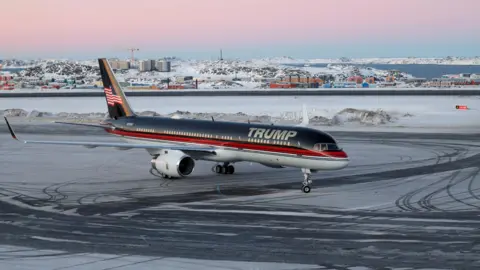 Reuters
ReutersTrump Jr. was welcomed by local businessman Jorgen Boassen, who once campaigned for the president-elect.
He told local media that he was Trump's “biggest fan” and that “of course they are interested in our country, and welcome them to come and see our country. It's also about opening up for trade and cooperation.”
The city of Nuuk is the northernmost capital of the world. It has a thriving civil society and a strong press. And there is some satisfaction that Trump's comments have driven the debate over Greenland's independence on the international stage.
There must be a Greenland that is no one's colony, said campaigners like Kuno Fenker, a ruling coalition MP and member of the local parliament's foreign affairs and security committee.
We meet near the harbor, beneath the bronze statue of Hans Eged, the 18th-century missionary who is widely seen here as the man who paved the way for colonization.
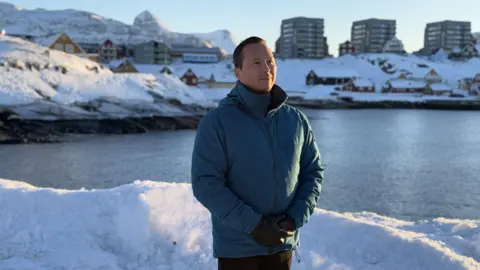
“Donald Trump is a politician,” Mr. Fenker said.
“He's a tough businessman, and we know his rhetoric, and that rhetoric is something we've gotten used to since 2019, and it's just a matter of talking to a colleague, an ally, about how we can solve things here in the Arctic and here. Also in NATO.”
Mr. Fenker provides the central argument of pro-independence campaigners.
“What is needed here is that Greenland as a sovereign state should negotiate directly with the United States, and Denmark is not doing it for us.”
Independence from Denmark could come at a significant financial cost.
Greenland receives subsidies worth about a fifth of its GDP each year from Copenhagen. Mr. Fenker suggested, like other leading figures here, that the island would negotiate with America and Denmark for support.
“We are not naive about this. We also need support in defense, security and economic development. We want a sustainable and self-sufficient economy.”
Masana Egede, the editor of local newspaper Sermitsiak, admitted he was worried about the implied threat of force from Donald Trump, but wanted to see how well the reality matched the rhetoric.
As for independence, Mr. Egede is frustrated by what he sees as a polarized debate in the local and international media.
“We're telling this story too much that it has to be about freedom or not about freedom. But within this story is that people want freedom, but not at any cost. There's a standard of living that has to be maintained. There's trade-offs that have to be maintained.”
There is an expectation that at some point – not immediately – there will be a vote in favor and Denmark will accept the result.
In the wake of Donald Trump's latest comments, the island's Prime Minister Mutt Egede spoke at a joint press conference with Danish Prime Minister Mette Frederiksen.
“We don't want to be Danish, we don't want to be American, we want to be Greenlandic,” he said. The Danish prime minister was careful not to offend anyone, least of all the incoming US president.
“The debate over Greenland's independence and recent announcements by the United States show our great interest in Greenland,” he said. “Events that set in motion many thoughts and feelings with many in Greenland and Denmark.”
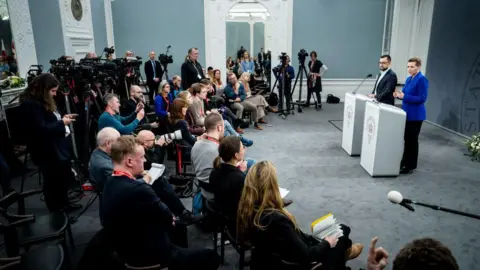 Getty Images
Getty ImagesMrs. Frederiksen knows well how deep feelings run in Greenland. Memories of injustice and racism remain fresh among the indigenous Inuit here.
Scandals such as the campaign to insert IUDs (intrauterine devices) to prevent pregnancy in thousands of Inuit women and girls in the 1960s and 70s plagued relations between Greenland and Denmark.
It is not known how many of these processes were carried out without the consent of those involved, but the number is substantial. The goal was to depopulate Greenland.
Malina Abelsen is a former Minister of Finance in the Government of Greenland and is now a consultant to companies and organizations working on the island. He has also worked for leading businesses in Greenland such as UNICEF Denmark and Seafood Group, Royal Greenland.
Ms. Abelsen believes more needs to be done to address past injustices.
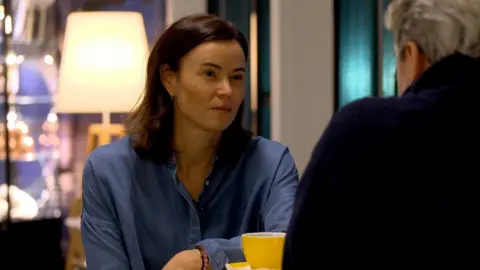
“I think a lot of people are saying, maybe even the Danish government and the state, 'Oh well, you know it happened in the past. It was years ago. How can we be responsible for it? It's time to move on.'
“But if you don't recover, and if you don't accept what happened to you, you can't move on. This is something we have to do together with Denmark, Greenland can't do anything on its own.”
And despite her own high profile in civil society and business, Malina Abelsen says that when it comes to racism – for example jokes about Inuit people – she can “speak for most Greenlanders in that we've all experienced it in our lives”.
The issues of self-control and facing the past are intimately intertwined.
Now Donald Trump's intervention has put both in the eyes of the world.
But the message we hear – from remote settlements in the fjord to the capital city of Nuuk – is that Greenland's fate must be decided here, among people whose voices have been ignored for too long.
With additional reporting by Adrian Murray and Kostas Kalergis.
